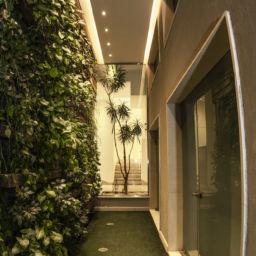
Source: Entrepreneur Arabic
Publication date: 06-26-2016
Last year, the Central Agency for Public Mobilization and Statistics announced an increase in the amount of carbon dioxide emissions resulting from the consumption of petroleum products and natural gas; by 0.1% in Egypt.
The average per capita carbon dioxide emissions amounted to 3.88 tons/capita in 2011, compared to 1.98 tons/capita in 2000, an increase of 96%. The reason for this is due to the increase in industrial and residential activities that lead to an increase in heat emissions.
With Egypt’s entry into the scope of climate change, it has become more vulnerable to environmental and human disasters, which necessitated emerging projects to provide preventive and curative solutions to these problems.
With this in mind, brothers Sherif and Tarek Hosni founded Schaduf in early 2011 (following the January revolution), as an Egyptian startup concerned with planting roofs and walls using hydroponics technology. This technology relies on a mineral nutrient solution to grow plants in containers without soil.
The system consists of a network of pipes of appropriate sizes, which pass through the water loaded with nutrients, while the plants are placed in upper openings along the pipe, and the feeding and discharging basins are among the most important components of this system, and they are two basins of water placed in one of them nutrients and fertilizers, while the discharge basin receives water after leaving the system. The system recycles the water to irrigate the plant again.
Planted roofs and walls provide solutions to more than one environmental problem. It eliminates the carbon emissions of buildings, as well as lowers the temperature in the building.
The study supported the Hosni brothers in their entrepreneurial journey. Sherif studied mechanical engineering at the American University in Egypt, while Tarek studied industrial engineering in America.
Schaduf’s services are diverse, including sustainable garden design, rooftop cultivation in urban and squatter areas, wall cultivation, advisory services and maintenance work for cultivated areas.
Multi-channel business model
In his interview with Interpreneur Arabia, Tariq Hosni said: “The NGOs finance projects for planting rooftops in slums, and we use simpler and less expensive techniques, and indeed we have succeeded in implementing more than one project in many of these dwellings.”
“Schaduf” managed to plant the roofs of 20 houses only in Izbat Al-Nasr (an informal area in Cairo). Hosni continues: “The residents of the buildings whose roofs are planted were able to obtain additional income from the proceeds from the sale of the crop resulting from the cultivation of these roofs, in addition to their access to food free of pesticides, although this issue is not a priority for them.”
As for commercial projects, they get the lion’s share of the Schaduf business model. This includes planting gardens on the roofs and walls of companies and homes in residential complexes, restaurants and commercial complexes, in order to add an aesthetic view, provide thermal insulation for those buildings, reduce the proportion of carbon dioxide in the surrounding air, and purify it from impurities. This is in addition to the positive psychological effect of green plants on humans in general.
“The prices of planting roofs are determined by the meter and according to the customer’s requests, and it is easy for us to provide them at prices that suit all capabilities. As for planting walls, it is considered expensive in terms of system and technology,” explains Hosni, after he refused to reveal the prices of his company.
“Schaduf” in Numbers
From launch to date, Schaduf has collaborated with 50 companies and 100 homes in the field of rooftop cultivation. As it implemented 30 projects for planting walls.
“Shaduf” hydropically planted 32,310 square meters of land and roofs, in addition to 3,300 square meters of walls.
Schaduf’s clients include major players in the real estate development, telecommunications and other sectors. Among them are: “Palm Hills”, “Orascom”, “Vodafone”, “Tatweer”, and “SODIC”.
The two founders seek to expand Schaduf’s client base by marketing the company through major real estate, furniture and decoration exhibitions. This includes Le Marche, La Casa and the Egyptian Urban Forum.
obsessed with money
As usual with entrepreneurs, they always try to generate success from the womb of crises, as the Hosni brothers have been able to achieve the element of sustainability for their company during the past five years, despite its reliance on self-financing.
About this experience, Hosni says: “The investment climate is very stressful in Egypt, but we tried to take advantage of that by insisting on diversifying ways of reaping returns so that the company could achieve financial balance, which made the company’s position stronger in terms of status and value.”
Hosni continues: “There is no doubt that investment, if available, will stimulate an acceleration of work and raise our chances of growth and expansion to the Gulf countries.”
Hosni believes that the speed of growth is not required in the beginning, because it weakens the quality and makes the project unsustainable financially and administratively. Therefore, Hosni believes that now is the most appropriate time to seek investment, by attending global and regional events and talking to investors.
If the project succeeds in attracting investment, the two founders will direct their financial resources to strengthen the work team of 20 employees, as finding qualified cadres and competencies is one of the most important challenges facing us.













